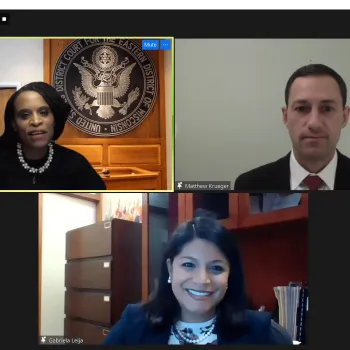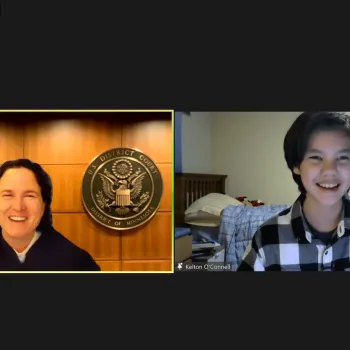Students and parents across the Midwest gathered around computer screens set up at kitchen tables, desks, and couches to join federal judges and volunteer attorneys in an educational celebration of the Bill of Rights in advance of its Dec. 15 anniversary.
The live, after-school web event “The Bill of Rights and You: 2020 Celebration,” hosted by federal courts comprising the Seventh and Eighth Circuits, is one of the virtual Bill of Rights Day activities offered by the Judiciary. The distance-learning programs are the latest in a series of virtual resources and events that assist teachers and parents in teaching civics education while in-school lessons are disrupted by the pandemic.
To prepare for the event, more than 500 students participated in a contest, submitting essays, videos, poetry, and songs that allowed them to express their ideas about the Bill of Rights. The entries, which were judged by volunteer lawyers and judges, provided a structured approach to learning about the Bill of Rights.
“Things are really tough for teachers right now, and for parents who are trying to fill the shoes of teachers during remote learning,” said U.S. Magistrate Judge Kate M. Menendez, of the District of Minnesota. “The federal courts have long been interested in civics education for students, but it felt even more important to find a creative way to bring the Bill of Rights to life for kids who are missing out on a lot of traditional learning opportunities during the pandemic.”
Menendez was the emcee at a virtual program that kicked off December as Bill of Rights Month. The 75-minute event on Dec. 2 gave students, parents, and teachers an inside look at the application of the Bill of Rights in the legal system. Appellate, district, and magistrate judges, as well as an assistant federal public defender and a U.S. attorney – a total of 12 legal system professionals – came together to teach the more than 175 participating households.
Live discussions among judges and volunteer attorneys, as well as pre-recorded statements by judges, created an evening that gave viewers a sense of the importance of the Constitution and the Bill of Rights in legal proceedings. Judges also responded to questions from participating students. To maintain engagement throughout the event, students were asked to fill in a word puzzle based on clues in the presentations and discussions among the judges and lawyers.
“With Bill of Rights Day programs and resources on local and national federal courts’ websites, we hope to support teachers and parents who are educating students about the courts in these difficult times,” said Chief Judge Rodney W. Sippel, of the Eastern District of Missouri. Sippel chairs the Judicial Conference of the United States’ Committee on the Judicial Branch, which takes a keen interest in civics education.
“I loved when the judges and lawyers spoke at a kid’s level and made examples for them to understand.” – Feedback from a parent.
On a feedback form submitted after the event, one student wrote that the program taught him that judging is very different from courtroom dramas on television. “Being a judge is a lot more interesting than I had assumed. I had thought you just whacked a stick and said, ‘order in the court’ a lot,” the student wrote. “I learned how important it is to be a judge, and how the Bill of Rights helps being a judge as well.”
The program culminated in the live announcement of a three-tiered Bill of Rights contest, organized into elementary, middle, and high school categories, where students could use their favorite form of expression – essays, poetry, art, videos, and song – to explore and explain the Bill of Rights.
First-place winners and the entries they shared during the program were:
- An original song videotaped in the family car that took first place in the elementary school category. The audience watched the video of Divya Thamman, of Minnesota, singing the song she wrote, incorporating each amendment and its meaning.
- An original video, produced by Kelton O’Connell, of Indiana, that won the first-place prize in the middle school category for successfully showing how the Bill of Rights has an impact on daily life.
- An original poem (pdf), that included references to landmark Bill of Rights cases, written and read by Brooke Leuchtefeld, of Illinois, who took first place in the high school category.
“Parents, teachers, and judges want students to be actively engaged in civics even within the confines of the virtual classroom,” said Rebecca Fanning, the Administrative Office of the U.S. Courts’ national educational outreach manager, who introduced the federal courts’ first national Bill of Rights Day initiative to 30 court outreach coordinators across the country. “Bringing judges into the virtual space as dynamic outside resource persons creates novel learning experiences for teachers and their students.”
Subscribe to News Updates
Subscribe to be notified when the news section is updated.


